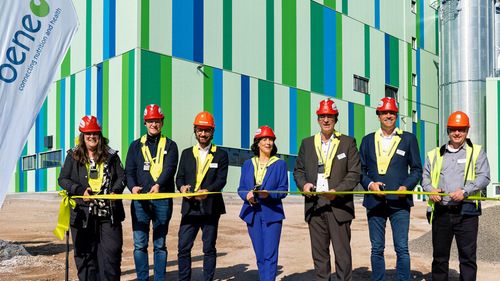BENEO inaugurates new pulse-processing plant in Obrigheim, Germany
BENEO, a leading manufacturer of functional ingredients for food, feed and pharma and member of the Südzucker Group, has officially inaugurated its first pulse-processing plant after a construction period of just one and a half years. The opening is the result of an investment of around €50 million by the Südzucker Group in its site in Obrigheim, Rhineland-Palatinate in Germany. Here, pulses such as the local faba bean are processed into ingredients for food and feed production. To mark the occasion, on 11th April, a special inauguration ceremony was attended by Daniela Schmitt (Minister of Economic Affairs of Rhineland-Palatinate), Johannes Steiniger (Member of the German Bundestag), Nicole Eicher (Mayor of Obrigheim), Dr Niels Pörksen (CEO of the Südzucker Group), Olivier Roques (CEO of BENEO GmbH), Niels E. Hower (Member of the Executive Board of BENEO GmbH) and Dirk Dinger (Chairman of the Works Council of the Obrigheim plant).
“BENEO’s new plant represents a strong commitment to Rhineland-Palatinate as a business hub. At the same time, the investment is driving innovation in the food industry and strengthening regional value creation. Future-oriented projects like this secure jobs, promote sustainable economic activity and strengthen rural areas,” said Daniela Schmitt, Minister of Economic Affairs for Rhineland-Palatinate.
Up to 25 new jobs will be created at the new plant, which has been built next to the existing BENEO site where its sugar replacer Isomalt and the smart carbohydrate PalatinoseTM (isomaltulose) are produced, on an area of around 4,000 square metres – about half the size of a football pitch. Sustainability has been a key focus for the new development, with the plant production running entirely on electricity from renewable energy sources. Additional power is generated by a rooftop photovoltaic system and waste heat from production is used to heat the building, while the pulse processing requires no water.
The site’s sustainability credentials are further reinforced by a zero-waste approach, ensuring that all raw materials are fully utilised as ingredients for the food and animal feed industries. The faba bean itself also plays a key role in sustainable agriculture, as pulses require no nitrogen fertiliser and enhance the soil quality for future crops. BENEO’s faba beans are grown in Germany, in close proximity to the production plant, and are REDCert2 certified, which is equivalent to the Farm Sustainability Assessment (FSA) from SAI at the highest “Gold” level.
At the inauguration event, Niels E. Hower, Member of BENEO’s Executive Board, emphasised the combination of tradition and innovation at the Obrigheim site: “What began more than 30 years ago with the processing of beet sugar into ingredients with added health benefits is now being continued at the new plant. The faba bean is a legume with a long history. Here in Obrigheim, we will process it into high-quality, plant-based ingredients that will contribute to future-proofed nutrition.”
“Feeding a steadily growing world population in a sustainable way is undoubtedly one of the biggest challenges of our generation,’ said Dr Niels Pörksen, CEO of the Südzucker Group. “The Südzucker Group pursues the vision of contributing to a healthy and sustainable world worth living in – and one of the many ways we are doing this is by investing in the expansion of our plant-based protein division. Today is therefore an important milestone for us.”
Across Europe, consumers are increasingly adopting more flexible and eco-conscious eating patterns. In fact, figures from 2023 show that 27% of European consumers identify as flexitarians[i], with 51% also reducing their meat consumption compared to the previous year, up from 46% in 2021[i]. Health concerns were the primary motivation for this reduction, cited by 47% of meat reducers, followed by animal welfare (29%) and environmental considerations (26%)[i].
With the expansion of the site, BENEO is addressing these evolving consumer trends and catering for rising customer demand. Pulse-derived proteins, such as those from faba beans which are used for meat or dairy alternatives and egg replacement, are increasingly sought after in the food industry as alternatives to animal protein, playing a key role in the development of plant-based products.
[i] GFI Europe. European consumer insights on the alternative protein sector (July 2024)
Latest news
Ports of Duisburg and Rotterdam advance energy transition together
Port of Rotterdam →With this LoI, the two major European logistics hubs reinforce their goal of jointly developing sustainable transport corridors via waterways as well as future-oriented initiatives for the energy t...
BASF constructs new electronic grade ammonium hydroxide plant in Ludwigshafen
BASF SE, Ludwigshafen →State-of-the-art facility to support the development of the advanced European semiconductor industry. New capacity meets growing demand for the manufacturing of chips in Europe
SynPet Technologies to bring emerging technology in plastics recycling to the Port of Antwerp-Bruges
Port Of Antwerp →SynPet Technologies is investing €300 million in an innovative facility that converts all types of plastics into a circular naphtha substitute without pre-treatment and with efficient conversion ra...
NEXTCHEM awarded a feasibility study by Mana Group and Equinor for the production of sustainable fuels in Norway leveraging its NX Circular™ technology
With the support of NEXTCHEM, Mana (NG Nordic) and Equinor are entering an early-stage strategic partnership to explore the potential development of the Nordics' first large-scale waste-to-methanol...
